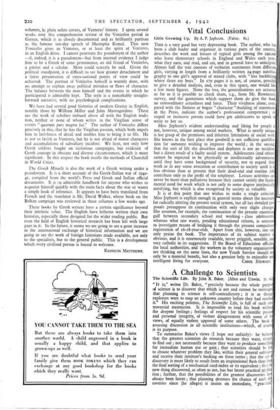Vital Conclusions
Girls Growing Up. By A. P. Jephcott. (Faber. 6s.)
Tins is a very good but very depressing book. The author, who has been a club leader and organiser in various parts of the country, describes the work and leisure of typical girls among the 240,0co who leave elementary schools in England and Wales each year; what they earn, and read, and eat, and in general have to anticipate. Almost half the text consists of verbatim statements from different girls, varying in length from a brilliantly written 24-page autobio- graphy to one girl's approval of mixed clubs, with " less backbiting where there are boys." In 17o pages it is not, of course, possibl to give a detailed analysis, and, even in this space, one would like a few more figures. None the less, the generalisations are accurate as far as it is possible to check them, e.g., from Mr. Rowntree's survey, and the quotations which support them do give the book an extraordinary actualness and force. Their vividness alone, com- pared with the flatness or bogus " character "-building of statements in the Press, indicate the author's professional competence ; no stupid or insincere person could have got adolescents to speak or write to her so.
Miss Jephcott's evident understanding and liking for people is not, however, unique among social workers. What is nearly unique is her grasp of the premisses and inherent limitations of social work She knows in the first place that goodwill is not sufficient qualifica- tion for someone wishing to improve the world ; in the second, that the sort of life she describes and deplores is not an accident, but a direct result of a faulty social system. Adolescents (and others) cannot be expected to be physically or intellectually adventurous until they have some background of security, nor to regard their work as in any sense avocation or contribution to society until it is less obvious than at present that their dead-end and routine jobs contribute only to the profit of the employer. Leisure activities can never be more than palliatives because they cannot satisfy_the funda- mental need for work which is not only to some degree intrinsically satisfying, but which is also recognised by society as valuable.
It is at this point that one wishes to make a single criticism. Miss Jephcott is explicit enough in general terms about the necessity for radically altering the present social system, but all her detailed p posals presuppose its continuation with only very slight changes She assumes, for example, the continuation of the present enormo gulf between secondary school and working - class adolescent whereas what one wants, pending educational reform, is someon to investigate means of bridging it through the present compulson registration of r6-r8-year-olds. Apart from this, however, one c only praise the book. The importance of its subject matter i obvious, and it is enormously readable, never priggish, sensible, an very catholic in its suggestions. If the Board of Education official the local authorities, and the workers in the voluntary organisation are thinking on the same lines, the new Youth Service should no only be a material benefit, but also a genuine help to enjoyable an
intelligent living for everyone. CAROL STEWART.


























 Previous page
Previous page